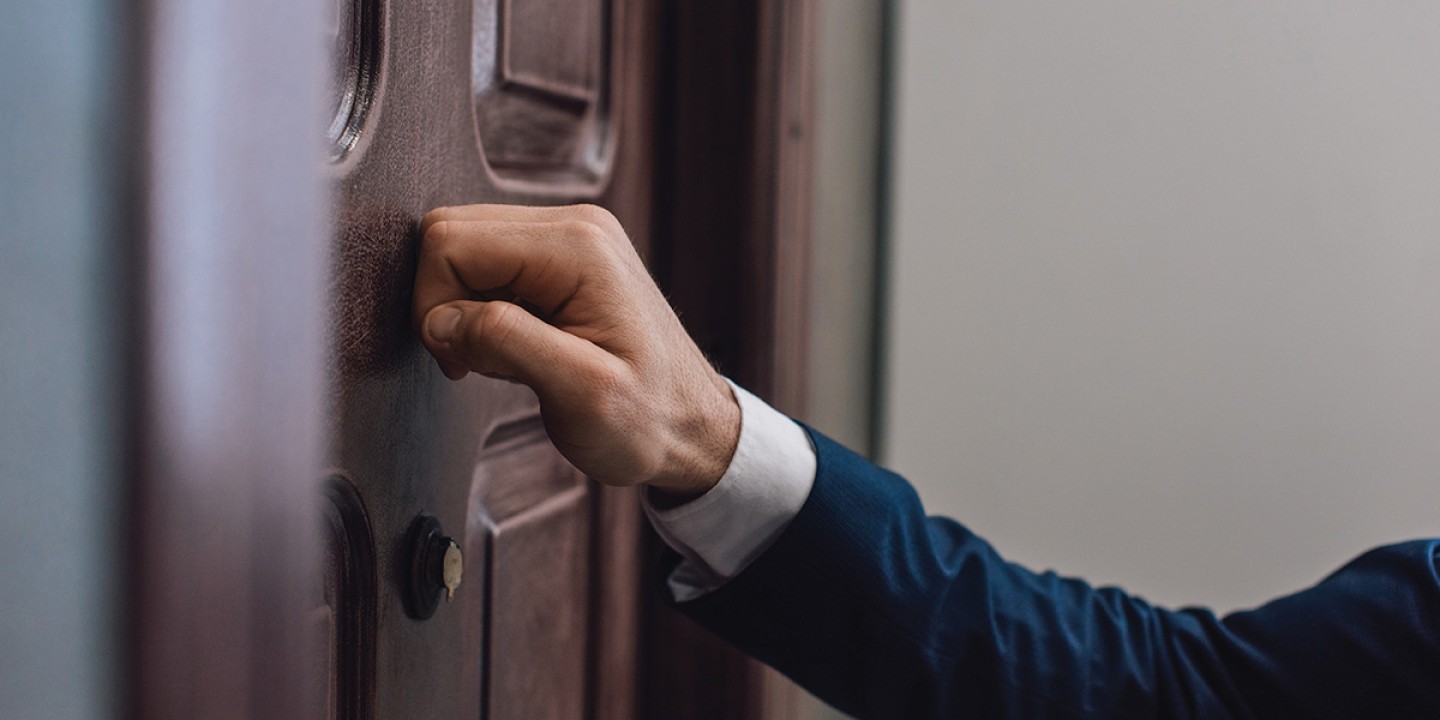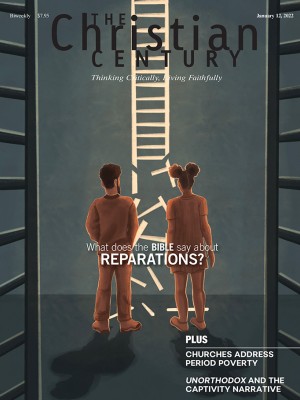
I saw them the other day, walking down the road. They’d been gone so long that I almost felt glad to see them. They wore the same almost unnaturally happy-looking smiles, the kind that make me nervous when they visit my house. After knocking, they stand far enough away from the front door to indicate they’re there for religiously nefarious reasons and not for nefariously nefarious ones. I don’t know their names. In fact, they’re not even the same people as before the pandemic began—but they have returned, no doubt about it. The religious door knockers are back in force, canvassing our side of town.
I’d counted their absence as one of the few bright spots of the COVID pandemic. In the midst of crisis, our collective anxiety level through the roof, I could at least be assured that no one from the Church of Jesus Christ of Latter-day Saints, no one from the Jehovah’s Witnesses, and no one even from any of Nashville’s evangelical churches would knock on my door. Last year, both the LDS Church and the Jehovah’s Witnesses had made official pronouncements, encouraging their followers not to go door to door. This halting of religious door knocking felt like an unmerited blessing bestowed on my house.
Read our latest issue or browse back issues.
I grew up as an evangelical Christian, and in my own time as a proselytizer extraordinaire, I must have knocked on hundreds of strangers’ doors. So you might think, even with that way of life behind me, that I would welcome, with some form of spiritual simpatico, these door knockers when they come to share their good news. Nothing could be further from the truth. When a stranger comes to my door trying to convert me to some particular view of spirituality, I feel like my privacy has been invaded. I’m not unnecessarily rude to them. After all, I’m still a practicing Christian, and I can’t imagine Jesus cussing out strangers for knocking on his door, though sometimes I wish I could.
Most Monday evenings from the time I was five until I was 16, you could find me at my childhood church’s visitation night. We’d knock on the doors of people who’d visited the church, of their neighbors if our intended target wasn’t home, and even of church members who’d gone AWOL.
One Monday night when I was 15, I went door knocking with another church member and one of our pastors. We’d been studying a manual that taught us an evangelical sales pitch, aimed at helping us deliver our message with maximum impact. The manual instructed us to pay attention to the house and the yard as we approached, size up the situation. Was the person single or married? If there were toys in the yard, we were to lead with questions about their children; if there were classic cars, then a conversation about automobiles, and so on.
We were instructed to make small talk, and then, with all the subtlety of a sledgehammer, ask, “If you were to die tonight, where would you spend eternity?” Whatever confused answer they gave, we were to offer the following words of assurance to set up the sales pitch: “What if I told you that before we finish talking tonight, you could know where you’d spend eternity?”
Even as I learned the script, the lines felt forced, the spiritual equivalent of, “What would you say if I told you I could get you approved for a loan tonight and put you in a new car for less than $300 a month?” except that the loan officer was us, the bank was Jesus, and the new car was your eternal salvation.
The house we pulled up to that night was a double-wide trailer with a deck attached. The couple had recently visited our church. No toys in the yard meant likely no children. When she opened the door, the wife smiled and let us in. The house still smelled of dinner, and the woman’s husband sat on the couch, his mostly empty plate on the coffee table in front of him. He hardly looked away from ESPN on the TV, as we hurried about the work of assessing the state of their everlasting souls. As the woman talked excitedly, the husband just sat there, his resentment palpable.
When we asked about the unlikely but possible scenario of her impending death on that very night, the wife began telling us how much she loved God and how much she loved to pray. “Now, you’re gonna think I’m crazy,” she said, after which she confessed that just that morning, she’d prayed earnestly to God Almighty that she “have a good hair day.” She then pointed to her hair and with a nod offered us her incontrovertible evidence of God’s power to answer prayer, right there in her very own divinely inspired coif. Whether it was humidity, product, or supernatural intervention, her hair did look stunning that day, just the right height and bangs for 1995.
My pastor assured her that this didn’t sound crazy at all. I, on the other hand, thought it was one of the most ridiculous theological assertions I’d ever heard. I sincerely hoped that God didn’t take time off that Monday from tending to real suffering throughout the world in order to offer divine assistance at taming an unruly cowlick.
The husband offered curt answers and paid little attention to his wife’s story or to anything we were saying. He kept ESPN on at a low volume and looked at us occasionally during the commercial breaks.
In that moment, I was struck by the husband’s indifference. How rude, I thought. With time, however, and a shifting perspective, I stopped judging the man so harshly. After all, the guy was finishing his dinner, trying to find a little peace in his life and watch some sports, when in we barged with all this talk of heaven and hell.
As the years passed, whenever religious door knockers came to my house, I began to feel more and more like that husband. Perhaps it was my own experience with the spiritual sales manual, knowing that as someone came to my door, they were likely sizing me up, checking out our cars, gathering whatever intel they needed for a way into conversation.
I’ve noticed lately, though, that I’m softening around the edges. Maybe it’s age, or maybe it’s the loneliness that the pandemic has stoked in me, the physical and the psychological distance I’ve felt being kept from the immediate presence of so many loved ones and so many strangers.
Sure, it might be intrusive, and it might feel threatening. It most certainly is arrogant for someone to approach you, to assume they know best about the state of your soul. But then again, perhaps there’s something of love in the earnestness of the religious door knockers, to care enough to stand there knocking, offering to us strangers the answers that have changed their own lives, knowing they’re likely to get doors slammed in their faces along the way.
Although I’ve seen them in the neighborhood, they haven’t made it to my door yet, at least not when I’ve been home. I wonder who’ll be the first sales team to come knocking? Jehovah’s Witnesses? A dynamic duo from the Latter-day Saints? Some enthusiastic evangelicals?
No doubt some of them are selling toxic versions of faith, replete with hell waiting to swallow us up, dependent on whether or not a few magic words are uttered in a prayer.
Even still, as I think about the religious door knockers, I’m struck by the image of Jesus standing at the door, knocking, that image from Revelation that I heard exegeted so often in my evangelical childhood.
Perhaps the door knockers can remind us all if not of the breadth and depth then at least of the tenacity of God’s love. The love that knocks and lingers, that waits for us to finish dinner and turn off the TV, that waits for us when we offer up our good hair day prayers, that waits for us to get over ourselves and our religious pride and our curmudgeonly small faith. The love that waits for us until we’re broken and lonely and know ourselves as needful of grace.
The pandemic has been so hard on most of us. I hope that somehow I’ll be kind when the religious door knockers come again, whoever they are, whatever salvation they’re selling. I want to be there, heart at least a little open, as someone tells me their good news. And perhaps, if I’ve listened deeply enough for the sound of Jesus’ knocking, I can share the inkling of good news that I’ve felt and am coming to know, of the breadth and the depth and the tenacity of a God whose love holds us all.
A version of this article appears in the print edition under the title “Somebody’s knocking.”





